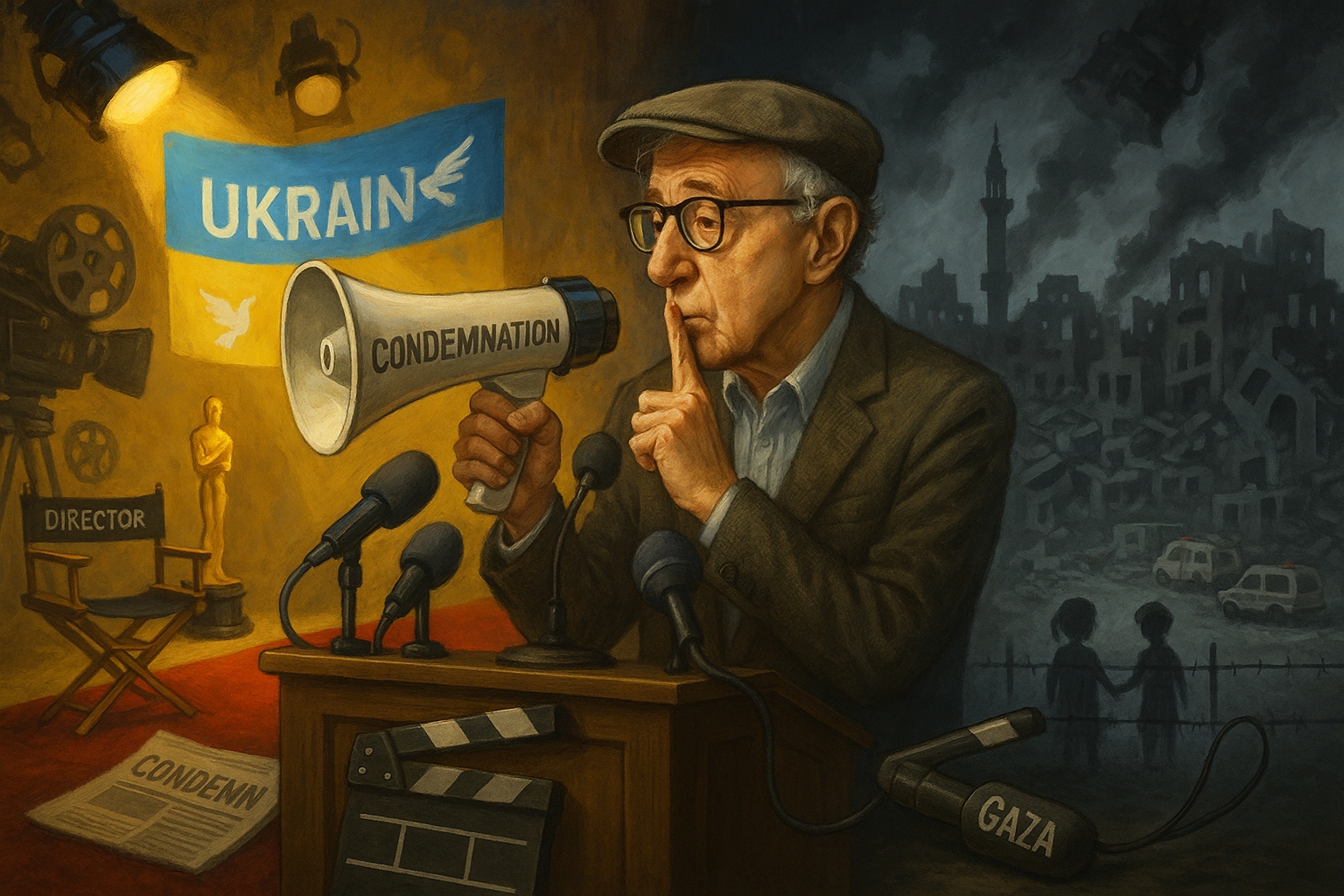Woody Allen’s Selective Outrage: Concern For Ukraine, Indifference Toward Gaza
Empowering Weak & OppressedJaved Akbar
Rabi' al-Awwal 08, 1447 2025-09-01
News & Analysis
by Javed Akbar (News & Analysis, Crescent International Vol. 55, No. 7, Rabi' al-Awwal, 1447)

Woody Allen’s attendance at the Moscow film festival drew sharp criticism from Ukraine. The director responded that he did not “feel cutting off artistic conversations is ever a good way to help,” after Ukraine’s foreign ministry called his participation a ‘disgrace’ – The Guardian, UK (August 25, 2025).
Woody Allen, the American filmmaker, writer, and actor whose career has spanned more than six decades, is celebrated for his sharp wit and neurotic humor in films such as Annie Hall and Manhattan. Once hailed as one of Hollywood’s most influential filmmakers, he has also long been a figure of controversy.
His personal life is shadowed by allegations that fractured his reputation. Today, he stands not only as a cinematic icon but also as a symbol of the uneasy intersection between art, morality, and public responsibility.
It is precisely in this moral arena that Allen now falters. With cultivated wit and vaunted posturing, he claims to see with crystalline clarity the atrocities committed by Russia in Ukraine. He does not hesitate to denounce Vladimir Putin, does not hesitate to name the aggression “appalling.”
Yet, when the same moral lens ought to be turned toward Gaza—the starving children, the bombed hospitals, the pulverized neighborhoods, and the slow-motion strangulation of a people’s very existence—he becomes suddenly mute and completely blind. His conscience, like that of so many western figures of influence, collapses into cowardice.
This silence is not neutral. It is complicity. To see Russian barbarism and name it, as Allen has done, but to witness zionist savagery—the bombardment, the siege, the systematic extermination unfolding since October 7, 2023—and refuse to utter even a whisper of recognition, is hypocrisy of the highest order.
One cannot claim to defend human dignity by practising selective outrage. One cannot claim to uphold justice while rationing empathy, as though Palestinian lives are somehow deemed cheaper, and their death less worthy of grief than European ones.
Ukraine’s foreign ministry calls Allen’s presence at Moscow’s festival a “disgrace.” Perhaps so. But is there not a deeper disgrace in their own silence on Gaza’s slaughter?
Is this the calculus of our so-called enlightened age—a hierarchy of death, where the value of a corpse depends on its passport, its skin tone, its religion? What language can we use for this moral bankruptcy except to call it by its true name: the ugliest form of racism, dressed up in diplomatic euphemisms and artistic pretenses?
Allen, in his statement, extols the virtue of “artistic conversations,” using the language of culture to veil his moral silence. He assures us that art should not be cut off, that dialogue must continue.
But art divorced from conscience is no longer art—it is ornamentation, empty and hollow. Conversation that averts its gaze from genocide is not dialogue, it is desecration. To speak of cinema in Moscow while Gaza burns is to strum a violin over the cries of the condemned, turning aesthetic discourse into a theatre of indifference.
The conscience of the world’s leaders has died. They issue communiqués of concern while the children of Gaza are wrapped in white shrouds. They convene conferences on peace while blessing the merchants of war. And men like Woody Allen, who see themselves as moral intellectuals, add another layer of betrayal by cloaking silence in the garb of “artistic integrity.”
History will remember this duplicity. Just as it remembers those who stood mute while South Africa bled, while Bosnians were slaughtered, while Rwanda was reduced to bones and ashes. The hypocrisy, the insensitivity, the cowardice—these are not minor failings. They are crimes of conscience.
And so, while Woody Allen lectures the world on the sanctity of “artistic conversations,” let it be known: true art is born of moral vision. True art demands a reckoning with suffering wherever it occurs. Anything less is not art at all—it is a mask for indifference, and indifference in the face of genocide is a form of violence itself.
Javed Akbar can be reached at: mjavedakbar@gmail.com

